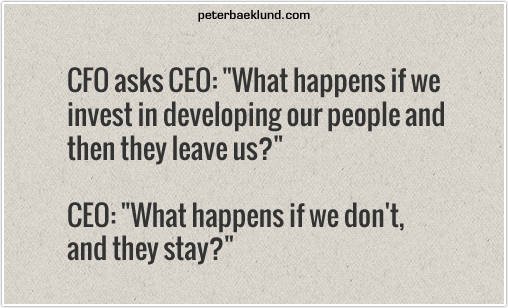I see patterns. Fear not, this isn’t the introduction to a new M. Night Shyamalan movie but I do enjoy opportunities where I can connect the dots. Maybe it is the linear, logical, left –brain, former programmer in me but I relish when I find patterns that emerge across different disciplines, groups, organizations, etc. Five years ago I was part of a public policy group that mixed professionals from different worlds – for-profit, nonprofit, government, education, etc. The goal of the program was to advance public policy awareness and build public policy leadership. What I quickly recognized was that many of the same issues that were challenging me in the “for-profit innovation arena” were also plaguing these other groups. The challenges of funding, personal & organizational risk, managing expectations, and the fear or failure were consistent. There were some nuances but there was far more similarity that difference.
We often hear about the importance of failure when driving new ideas or new businesses. We’re given advice to Fail Early, Fail Often, and Fail Cheap. While this well-meaning advice is accurate on the whole the reality is that failure in most organizations comes with pretty heavy consequences. Within mature organizations a failed initiative can have a dramatic impact for both the individual and the long term success of organization itself.
 As families gather in the United States this week to celebrate the Thanksgiving holiday there will likely be a common inconsistency in their stories. Many will likely be thankful for the job that they currently have even though they are considerably dissatisfied with that job. With the economic downturn organizations have been so focused on squeezing out costs from their operations that most have neglected investing in their people. The result is that most employees are at a historically low level of engagement with their employers.
As families gather in the United States this week to celebrate the Thanksgiving holiday there will likely be a common inconsistency in their stories. Many will likely be thankful for the job that they currently have even though they are considerably dissatisfied with that job. With the economic downturn organizations have been so focused on squeezing out costs from their operations that most have neglected investing in their people. The result is that most employees are at a historically low level of engagement with their employers.
Earlier this week I was presenting in front of a group of successful entrepreneurs, each of whom had built a business from scratch and turned it into a $10m+ company. As they talked about their businesses you could see the passion for their company oozing out of their pores. They had “made it” by almost every definition of the word but you could tell that their entrepreneurial spirit hadn’t waned. Their success had afforded them more control over their time but they certainly weren’t resting on their laurels. They were passionate about growing their businesses. This post is my first in a series on Leadership in Small Companies vs. Big Companies and covers how small companies can be more focused on hiring for passion.
When executives are allowed to hide their innovation failures the entire organization suffers. False expectations are set for the entire group of executives, innovation leaders see their careers scuttled, and every other employee fails to learn from the failure. Without clear organizational expectations of documenting, sharing, and learning from our failures we will continue to see them covered up. Left to our own devices we will naturally seek to avoid our failures and move into self-preservation mode. In my work helping organizations to build strong innovation processes this is a common issue but it can be resolved.
So today is the 1st anniversary of launching my blog on leadership, innovation, and failure. I cannot even start to explain how much I have learned along the way. My goal was to mix my ideas and my research trying to post at least one article per week. Over the last year I have written 68 posts which have been read by over 5000 unique visitors to the blog. I would like to offer a huge “thank you” to everyone who took the time to comment, provide feedback, or help share my articles with your networks!
Last year I had the chance to do an interview with a former classmate and friend Lt. Col. Mark Weber on his thoughts regarding “Leadership, Learning, and Failure.” Three years ago Mark had gotten a request to rejoin General David Petraeus as he was appointed to take command of the war in Afghanistan. From a routine blood draw and examination it was discovered that what Mark thought had been an ulcer was in fact cancer. For the last few years, Mark has taken great care to share his journey in his fight against cancer illuminating his circumstances to help others in their fight. Frequently he didn’t have “answers” from the medical community so he decided to lead the assault himself, figuring it out along the way. In the summer of 2012 Mark decided to take control of writing his own narrative too, wanting to share not just his cancer journey but his life story in a book Tell My Sons. Like every father, he wanted to hand down his thoughts, ideas, and lessons learned for his sons.
Receive periodic email updates from Matt Hunt including his published pieces, updates on his progress, and more!